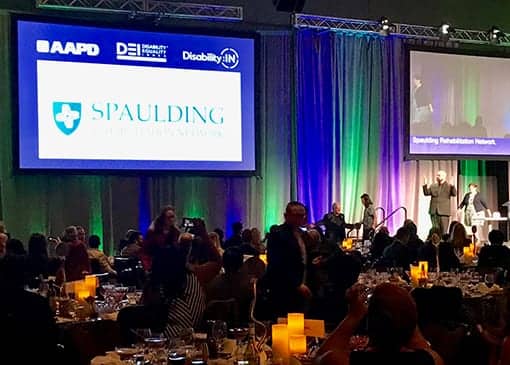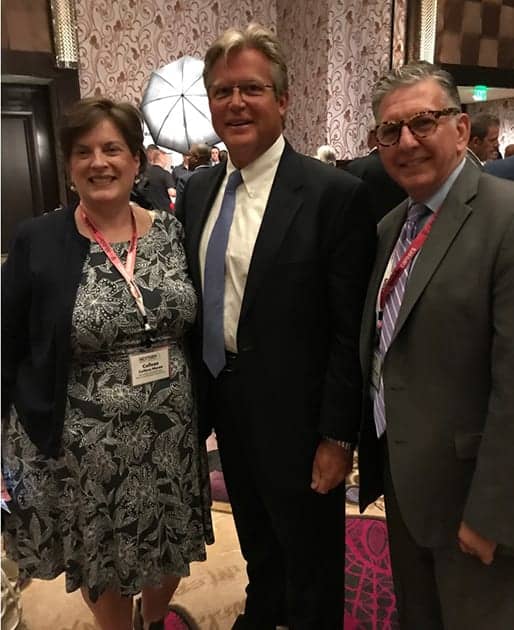For the second year in a row, Boston-based Spaulding Rehabilitation Network has been named one of the “Best Places to Work for Disability Inclusion.” It received a perfect score of 100 in the 2018 Disability Equality Index (DEI).
The DEI—recently released by Disability: IN, formerly the US Business Leadership Network (USBLN), and American Association of People with Disabilities (AAPD)—measures how well companies are excelling in their commitment to inclusive environmental, social, and governance policies.
This is the fourth year measured by the index, which measures Fortune 1000 and Am Law 100 companies across 25 unique business sectors.
The 126 companies recognized as being a “Best Place to Work for Disability Inclusion,” resulting from scoring 80 or above in the DEI, were honored during the USBLN 20 annual conference in Las Vegas on Wednesday, July 11.

Spaulding Rehabilitation Network was recognized recently as a “Best Place to Work for Disability Inclusion” during the USBLN 20 annual conference in Las Vegas.
“To achieve a perfect score in the 2018 Disability Index is truly a proud achievement for all of us at Spaulding,” says David Storto, president, Spaulding Rehabilitation Network, in a media release. “This is a testament to the commitment from our entire workforce to embrace that inclusion should be part of everything we do.”
“Work is empowering for all of us and whether you live with a disability or are re-entering the workforce as a returning veteran, you deserve an equal opportunity. We are so proud to be among the companies at the forefront who understand inclusion is more than the right thing to do; it’s good business,” he adds.
The companies participating in the 2018 DEI have a total global workforce of approximately 7.8 million workers. In its fourth year, the DEI has experienced nearly a 32% increase in year-over-year participation, signaling disability inclusion is on the rise across industries. 70% of businesses participating in the 2017 DEI chose to also participate in 2018, utilizing the tool as multi-year benchmarking roadmap.
“AAPD is thrilled to see increased participation in this year’s DEI. The commitment to disability inclusion is becoming a priority for more and more corporations,” states Helena Berger, president and CEO of AAPD.
“While we have made great strides since the passage of the Americans with Disabilities Act, the number of disabled individuals getting hired has not significantly increased. The DEI was created to help advance employment opportunities and outcomes for people with disabilities,” she continues.
“We applaud those companies that choose to take the DEI year after year and truly commit to advancing disability inclusion,” comments Jill Houghton, president and CEO of Disability: IN, in the release. “Although we are far from true inclusion of people with disabilities across the enterprise, the DEI signals corporate America is recognizing inclusion as a competitive edge and beneficial for all.”

L-R – Colleen Moran, Director Work Force Programs Spaulding Rehabilitation Network; Ted Kennedy, Jr Disability Advocate & USBLN 20 Emcee; and Oz Mondejar, Senior Vice President, Mission and Advocacy, Spaulding, and Vice President of Talent Management, Partners HealthCare.
Upon accepting the recognition at the USBNLN 20 Conference, Oz Mondejar, senior vice president of mission and advocacy at Spaulding Rehabilitation Network, comments, “To receive this national honor from Disability: IN and the AAPD is incredibly rewarding for all of us at Spaulding. This recognition validates our goal to be a leader on work force development and inclusion and will energize us to push even further beyond compliance by creating new approaches and opportunities.
[Source: Spaulding Rehabilitation Network]



